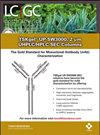当雇主雇佣分离科学家时,他们在寻找什么?
IF 0.7
4区 化学
Q4 CHEMISTRY, ANALYTICAL
引用次数: 0
摘要
根据美国国家科学院(NAS) 2019年的报告“转化分离科学的研究议程”,近年来,美国分离科学的学术职位数量大幅减少,一些大学选择停止招聘该领域的教师。具体来说,自1987年(美国国家科学院就这一领域发表上一份报告的年份)以来,顶级化学系的“分离研究人员”数量下降了40%,顶级化学工程系下降了30%。与此同时,国家政府资助机构(如美国国家科学基金会[NSF])已经大大减少了对分离科学的资助。尽管美国最大的经济部门对分离科学家和工程师的需求持续不断,但所有这些都发生了。LCGC North America采访了默克研究实验室的Caroline McGregor和Justin Pennington,讨论了上述事件对公司招聘行为的影响,以及雇主在考虑开放式分离科学家职位时通常会在候选人身上寻找什么。本文章由计算机程序翻译,如有差异,请以英文原文为准。
What Are Employers Looking For When Hiring Separation Scientists?
Per the U.S. National Academies of Science (NAS) 2019 report “A Research Agenda for Transforming Separation Science,” the number of America’s academic positions in separation science has decreased considerably in recent years, with a number of universities choosing to stop hiring faculty in this area. Specifically, since 1987 (the year of the previous NAS report on this field), the number of faculty members readily identifiable as “separations researchers” has dropped by 40% in the top chemistry departments, and by 30% in the top chemical engineering departments. At the same time, national government funding organizations (such as the National Science Foundation [NSF]) have significantly reduced funding for separation science. All this occurs despite the continuing demand for separation scientists and engineers in the largest economic sectors of the United States. LCGC North America spoke to Caroline McGregor and Justin Pennington of Merck Research Laboratories regarding the effects of the aforementioned occurrences on their firm’s hiring practices, and what employers in general are looking for in candidates they are considering for open separation scientist positions.
求助全文
通过发布文献求助,成功后即可免费获取论文全文。
去求助
来源期刊

Lc Gc North America
化学-分析化学
CiteScore
1.00
自引率
55.60%
发文量
0
审稿时长
2 months
期刊介绍:
Founded in 1983, LCGC is the leading provider of digital and print content to the separation science market, enhancing the productivity, efficiency, and the overall value of separation techniques globally.
Founded in 1983, LCGC is the leading provider of digital and print content to the separation science market, enhancing the productivity, efficiency, and the overall value of separation techniques globally. With our commitment to editorial excellence we have pioneered innovation across a broad portfolio of digital and print platforms.
 求助内容:
求助内容: 应助结果提醒方式:
应助结果提醒方式:


